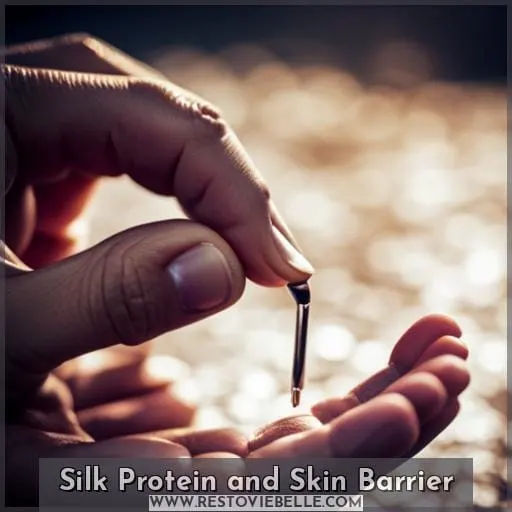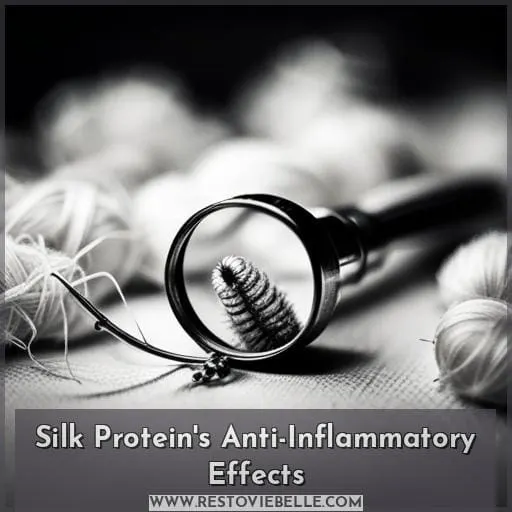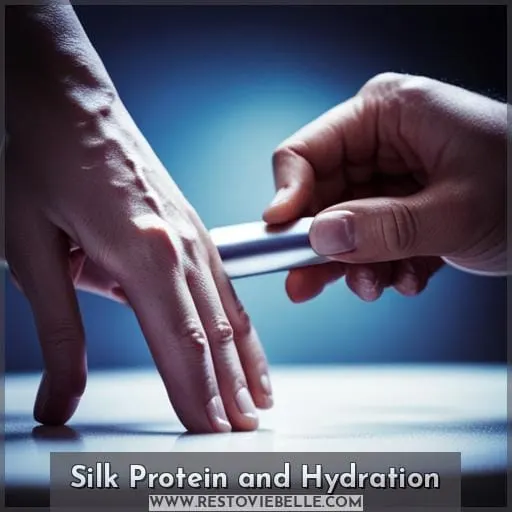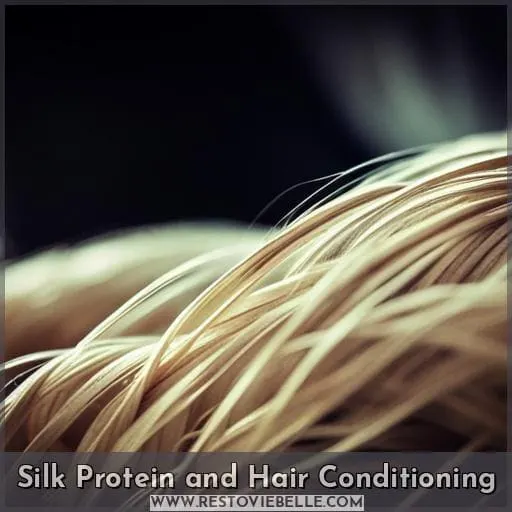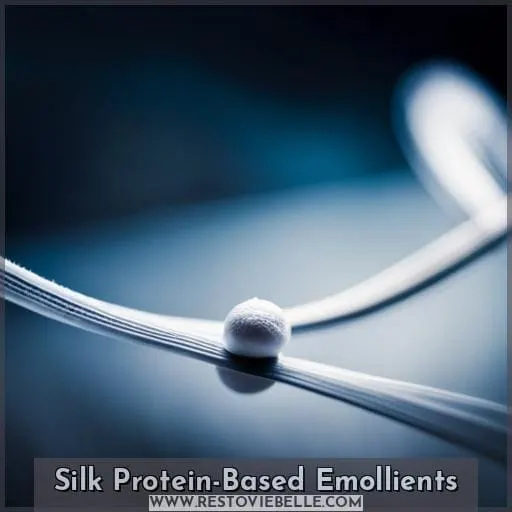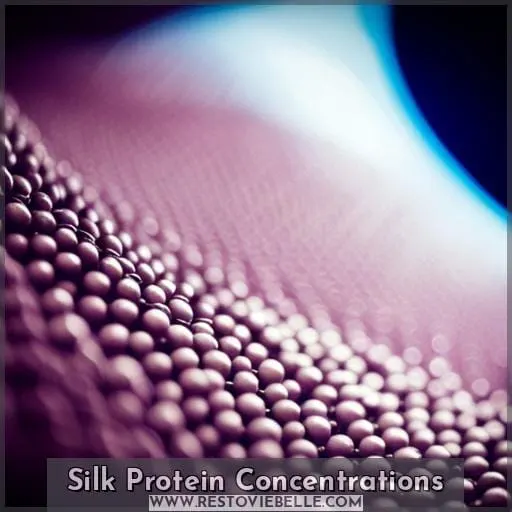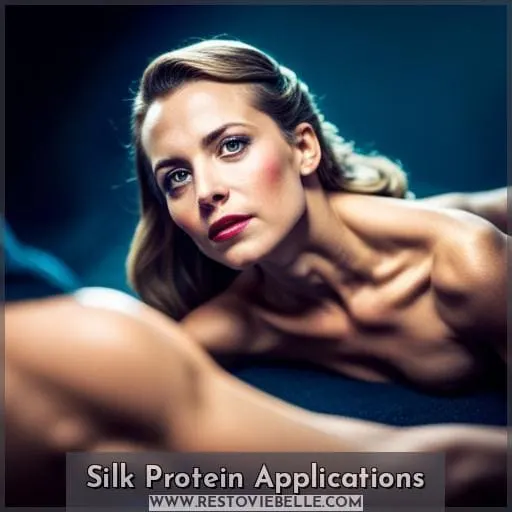This site is supported by our readers. We may earn a commission, at no cost to you, if you purchase through links.
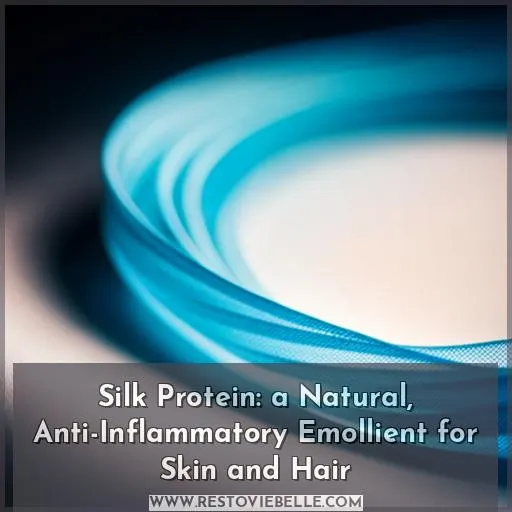 Did you know silk protein helps strengthen skin’s moisture barrier? This natural ingredient boasts anti-inflammatory effects to soothe irritated skin. Beyond its hydrating perks, silk protein also conditions hair, reducing frizz and volumizing strands.
Did you know silk protein helps strengthen skin’s moisture barrier? This natural ingredient boasts anti-inflammatory effects to soothe irritated skin. Beyond its hydrating perks, silk protein also conditions hair, reducing frizz and volumizing strands.
Formulating with silk protein allows products to harness its emollient properties for softer, smoother skin and hair.
Table Of Contents
- Key Takeaways
- Silk Protein and Skin Barrier
- Silk Protein’s Anti-Inflammatory Effects
- Silk Protein and Hydration
- Silk Protein and Hair Conditioning
- Silk Protein-Based Emollients
- Other Plant-Based Emollients
- Silk Protein Concentrations
- Silk Protein Applications
- Combining Silk Protein and Other Actives
- Frequently Asked Questions (FAQs)
- Can silk protein help improve the skin’s barrier function?
- Does silk protein have any anti-inflammatory effects on the skin?
- How does silk protein contribute to hydration of the skin?
- Can silk protein be used for conditioning and improving the health of hair?
- What are some other plant-based emollients that are commonly used in skincare products?
- Conclusion
Key Takeaways
- Silk protein acts as an emollient, providing immediate visual improvement and reducing frizz in hair.
- Silk protein-based emollients like Activeshine® Amazon 3R and Chemyprotein Silk SPD offer regenerating actions that improve softness, shine, and reduce frizz in both skin and hair applications.
- Silk protein concentrations should be carefully considered for optimal efficacy and safety in emollient products.
- Silk protein coats the hair shaft, seals the cuticle, and retains moisture, making it an effective emollient for conditioning hair.
Silk Protein and Skin Barrier
Silk protein strengthens the skin barrier, making it an excellent ingredient for addressing various skin conditions such as eczema, psoriasis, and dermatitis. The natural properties of silk protein help to repair and protect the skin’s outer layer, preventing moisture loss and reducing inflammation.
Studies have shown that silk protein-based emollients can improve wound healing and provide relief for burns by promoting tissue regeneration. Additionally, silk protein has been found to enhance hydration levels in the skin, keeping it moisturized and supple.
When incorporated into hair care products like shampoos and conditioners, silk protein helps to nourish and strengthen hair strands while improving manageability. With its multifunctional benefits for both skin barrier health and hair conditioning needs, silk protein is a valuable addition to any beauty routine.
Silk Protein’s Anti-Inflammatory Effects
Now that we’ve explored the role of silk protein in maintaining a healthy skin barrier, let’s delve into its impressive anti-inflammatory effects.
Silk protein has been found to inhibit inflammatory mediators, which play a key role in triggering and perpetuating skin inflammation. By reducing the production of these mediators, silk protein effectively reduces skin irritation and redness.
Moreover, studies have shown that silk protein improves overall skin barrier function. A strong and intact barrier is essential for protecting our skin from external aggressors and preventing moisture loss.
Additionally, this remarkable ingredient promotes wound healing by stimulating collagen synthesis and enhancing tissue regeneration.
But what about hair care? Is silk protein an effective emollient for hair fiber as well? The answer is yes! Silk proteins possess similar moisturizing properties when applied to our locks – they help retain moisture while providing nourishment for smoother strands with reduced frizz.
In conclusion, incorporating products containing silk proteins can offer both skincare benefits such as reducing inflammation and improving the integrity of the natural protective layer on your face or body while also promoting healthier-looking hair fibers.
Silk Protein and Hydration
To maintain optimal hydration, you need an emollient that keeps your skin and hair moisturized throughout the day. Silk protein is a natural ingredient that can help with this by binding water to the skin and hair, improving their hydration levels.
Here’s how silk protein contributes to hydration:
- Water Binding: Silk protein has a unique ability to hold onto moisture, acting as a reservoir for water on both the surface of your skin and within your hair strands.
- Skin Barrier Function: By enhancing the function of the skin barrier, silk protein helps prevent excessive transepidermal water loss (TEWL), keeping moisture locked in and maintaining hydrated skin.
- Hydration Benefits: The high affinity of silk protein for water means it provides long-lasting hydration effects when applied topically, leaving your skin feeling soft, smooth, and supple.
- Eczema Relief: Studies have shown that silk proteins can alleviate symptoms associated with eczema by reducing inflammation and increasing moisturization levels in affected areas.
By incorporating products containing silk protein into your skincare routine or using shampoos/conditioners infused with this ingredient regularly , you can improve overall hydrating power for healthier-looking hydrated.
Silk Protein and Hair Conditioning
Conditioning your hair with silk protein can provide numerous benefits for its softness, manageability, and shine.
Silk protein has been found to improve hair elasticity, reducing the risk of breakage and promoting healthier-looking locks.
It also helps to repair damaged cuticles, resulting in smoother strands with reduced frizz.
Additionally, silk protein can enhance the shine of your hair by reflecting light off its surface. This gives your tresses a lustrous appearance that catches attention wherever you go.
Another advantage is that silk protein acts as a conditioning agent for porous hair by filling in gaps on the strand’s surface and sealing moisture inside it. This leads to improved hydration levels and overall smoothness of the hair shafts.
Silk Protein-Based Emollients
Now let’s explore the benefits of silk protein-based emollients for skin and hair.
Activeshine® Amazon 3R is a natural alternative to silicones, providing immediate visual improvement and reducing frizz.
Chemyprotein Silk SPD offers a microrelief regenerating action that soothes and protects, improving softness, shine, and reducing frizz in both skin and hair applications.
Activeshine® Amazon 3R
When using Activeshine® Amazon 3R, a silk protein-based emollient, you can expect enhanced hair conditioning properties. This innovative ingredient provides not only effective hydration and softness but also acts as an anti-inflammatory agent for the scalp.
The efficacy of Activeshine® Amazon 3R has been scientifically proven through rigorous testing, ensuring its safety and stability in various hair care formulations. Its solubility allows for easy incorporation into shampoos, conditioners, masks, and finishing products to deliver long-lasting results that leave your hair feeling smooth and manageable.
Chemyprotein Silk SPD
Chemyprotein Silk SPD offers a natural solution for skin and hair hydration and conditioning.
This silk protein-based emollient strengthens hair fibers and promotes hair growth while reducing frizz.
It also aids wound healing and repairs skin barriers, making it useful for conditions like eczema.
The anti-inflammatory, anti-itching properties soothe irritated skin and prevent signs of aging.
Other Plant-Based Emollients
Let’s discuss other plant-based emollients that have shown beneficial effects for skin and hair.
Two examples include:
- Ceralmilk Premium SP, which contains lipoproteins from oat, wheat, and almonds to improve softness and shine while reducing frizz;
- Ceramida SH 1% 3R, derived from soy beans and sunflower seeds to protect hair from damage while leaving it feeling strong and healthy.
These plant-based emollients offer natural alternatives with potential benefits for skincare formulations.
Ceralmilk Premium SP
Continuing the discussion on silk protein-based emollients, let’s explore Ceralmilk Premium SP as a plant-based alternative:
- Lipoproteins from oat, wheat, and almonds mimic cell membranes.
- Improves skin barrier function and enhances hydration.
- Reduces frizz in hair and provides anti-inflammatory benefits for the skin.
- Soothes and protects while leaving both your skin and hair feeling soft and smooth.
Ceramida SH 1% 3R
To further explore the range of plant-based emollients, we’ll now delve into the benefits of Ceramida SH 1% 3R.
Derived from vegetable ceramides extracted from soybeans and sunflower seeds, Ceramida SH 1% 3R offers numerous advantages for hair. It improves softness and manageability, protects against damage, and leaves hair feeling strong and healthy.
With its INCI name as Hydrolyzed Silk Protein , this ingredient can be incorporated into various formulations such as shampoos, conditioners, masks, and finishing products to provide long-lasting results while ensuring safety.
| Benefits for Hair | Applications | Formulations | Safety |
|---|---|---|---|
| Ceramida SH 1% 3R | Improves softness & manageability | Shampoos, Conditioners, Masks, Finishing Products | Ensures safety |
Silk Protein Concentrations
When formulating with silk protein, it’s important to consider the appropriate concentration for optimal skin and hair benefits.
The concentration of silk protein in a formulation can greatly impact its effectiveness. Research has shown that different concentrations of silk protein have varying effects on the skin and hair. For example, a study comparing 3% silk protein versus 5% silk protein found that higher concentrations resulted in greater hydration and improved barrier function.
However, it’s also crucial to consider factors such as solubility and stability when determining the ideal concentration of silk protein in a product. Additionally, understanding how silk proteins interact with other ingredients is essential for creating formulations that maximize their benefits while maintaining stability.
Lastly, ensuring the safety of products containing high levels of Silk Protein should be prioritized through rigorous testing procedures.
Silk Protein Applications
Now let’s explore the applications of silk protein in shampoos and conditioners.
Silk protein, known for its emollient properties, can provide hydration and nourishment to the hair.
Incorporating silk protein into these hair care products can offer long-lasting results for healthier-looking hair.
Shampoos
You can use silk protein in shampoos to provide conditioning benefits.
- Gently cleanses hair while softening and adding shine.
- Removes impurities without stripping or drying hair.
- Detangles hair, making it more manageable.
Conditioners
For optimal hair care, incorporate silk protein into your conditioner for its natural, anti-inflammatory properties and nourishing effects on the hair.
Silk protein helps improve hair elasticity, strength, smoothness, and shine. It penetrates deep into the hair shaft to provide essential amino acids that repair damaged strands and promote healthy growth.
By using a conditioner with silk protein regularly, you can enhance the overall health and appearance of your hair while keeping it hydrated and protected from environmental stressors.
Combining Silk Protein and Other Actives
You may wish to combine silk protein with other beneficial ingredients in your formulations. For example, Allinea helps realign hair fibers while silk protein provides conditioning. Using emollients like Chemylan LEX along with silk protein can enhance softness and manageability.
Allinea
To enhance the benefits of silk protein in hair care, consider combining it with other actives such as Allinea.
Allinea is a powerful ingredient that can address multiple hair concerns. It helps reduce frizz and volume, improving manageability and smoothness.
By incorporating Allinea into your haircare routine, you can achieve the desired results of healthier-looking, more manageable hair with increased volume and reduced frizz.
Chemylan LEX
Another emollient that combines silk protein with actives is Chemylan LEX, a non-ionic emollient derived from lanolin. It has water absorption properties and helps stabilize foam while improving softness, shine, and manageability of hair.
Chemylan LEX reduces frizz and leaves hair feeling smooth for long-lasting results.
This emollient is scientifically formulated to provide these benefits without compromising safety or causing any known side effects. Its ingredients are carefully selected to ensure efficacy and user satisfaction.
Frequently Asked Questions (FAQs)
Can silk protein help improve the skin’s barrier function?
Silk protein can help improve the skin’s barrier function by providing hydration and promoting moisture retention. It has been shown to enhance the skin’s elasticity, smoothness, and overall appearance, making it a beneficial ingredient in skincare products.
Does silk protein have any anti-inflammatory effects on the skin?
Unfortunately, silk protein doesn’t have significant anti-inflammatory effects on skin. While it can provide moisture, the research on silk for inflammation is limited. Focus on proven anti-inflammatory ingredients like niacinamide or licorice root extract for reducing inflammation.
How does silk protein contribute to hydration of the skin?
Silk protein absorbs water, hydrating skin.
Its amino acids attract and bind moisture, while its low molecular weight allows deep penetration.
This hydration restores the skin barrier function, improving softness, smoothness and appearance.
Can silk protein be used for conditioning and improving the health of hair?
Yes, silk protein can help condition hair.
It coats the hair shaft for a smooth feel and seals the cuticle to retain moisture.
Silk’s amino acids also help strengthen hair against damage.
Use it in shampoos, masks, or leave-ins for manageable, shiny locks.
What are some other plant-based emollients that are commonly used in skincare products?
shea butter melts into the skin, providing hydration and nutrients.
jojoba oil mimics natural sebum, moisturizing while regulating oil production.
Conclusion
To summarize, silk protein is a natural emollient that offers numerous benefits for both skin and hair.
Its ability to strengthen the skin’s moisture barrier and soothe inflammation makes it an excellent ingredient for skincare products.
Additionally, silk protein conditions hair, reducing frizz and adding volume.
Formulating with silk protein can lead to softer, smoother skin and hair.
Its versatility and effectiveness make it a valuable ingredient in various applications, including shampoos and conditioners.
Incorporating silk protein into your beauty routine can provide hydration and nourishment for healthy-looking skin and hair.
